Upcoming Events

Our offices will be closed on Wednesday, July 4, in observation and celebration Independence Day, when bold men risked their lives, their fortunes, and their sacred honor to ensure the liberty we enjoy today.
Call to find how we can help you to ensure investigations add value to your case, through our continuing legal education (CLE) program approved by the State Bar of Texas. The one-hour presentation can be conveniently delivered in your office.
|
Next Edition Topics:
Enter the Dragon:
Part Two - Challenges of doing business in China
|
|
|
In this edition of VantagePoints, we begin a two-part series on doing business in China. This month we focus on managing risk through proper due diligence when Chinese buyers express interest in your company.
In the current landscape of changing U.S. and Chinese government priorities, it is essential to seek out actionable intelligence about the prospective buyer as soon as possible. Failure to do so can waste precious time and resources, and even impact the value of the company.
We welcome and appreciate your comments about VantagePoints, and hope you will recommend it to your associates. If you have questions or topics of interest, please send them to
[email protected].
J.R.Skaggs
Founder, Owner, and Manager
|
Enter the Dragon-Part One: Managing
risk
when Chinese
buyers
call
 Chinese investors are increasingly targeting American corporations for purchase. Between 2010 and 2016, Chinese investment in U.S. companies increased more than 900%.
[1] This rapid expansion did cool somewhat in 2017, though, as Chinese buyers announced only $44.5 billion in acquisitions, compared with $101.9 billion in 2016.
[2]
Last year's downturn can be explained in part by the present U.S. administration's "America First" position, manifested by its watchdog, the Committee on Foreign Investment in the United States (CFIUS), which scrutinizes offshore deals for adverse impact, especially in the realm of national security.
Another factor in the decrease in Chinese offers for American companies in 2017 was the Chinese government attempting to control the amount of capital flowing out of the country. It wanted to make sure the money flows to sectors matching official priorities, such as technology and petrochemical innovators. This new environment is likely to prove easier for state-owned companies to navigate than private firms.
[3] However, state ownership, financing, or control is often intentionally obscured.
An illustration of the U.S. government's hardened stance was the rejection of the proposed $1.3 billion acquisition of U.S. based chipmaker Lattice Semiconductor Corp. by a Chinese-backed private equity firm last September. This past January, CFIUS also blocked the $1.2 billion sale of MoneyGram to Ant Financial, a group controlled by Chinese multi-billionaire Jack Ma. In both decisions, the administration cited national security concerns, and in the
case of Lattice Semiconductor, the Chinese buyer was said to be largely funded and controlled by the Chinese government.
In a relative departure from the past, the CFIUS is taking specific issue with the often opaque ownership structure of Chinese investment groups seeking capital investment in the U.S. Complex or circuitous shareholder structuring is raising concerns like no other time before. Such methodology reasonably leads to suspicions of over-leveraging or shielding of undue control by the Chinese government.
For the savvy American stakeholder, wasting valuable time and resources to explore a purchase offer by a Chinese suitor, only to have the deal derailed by U.S. government action, is unacceptable. The added aftermath of... Read More
|
|
|